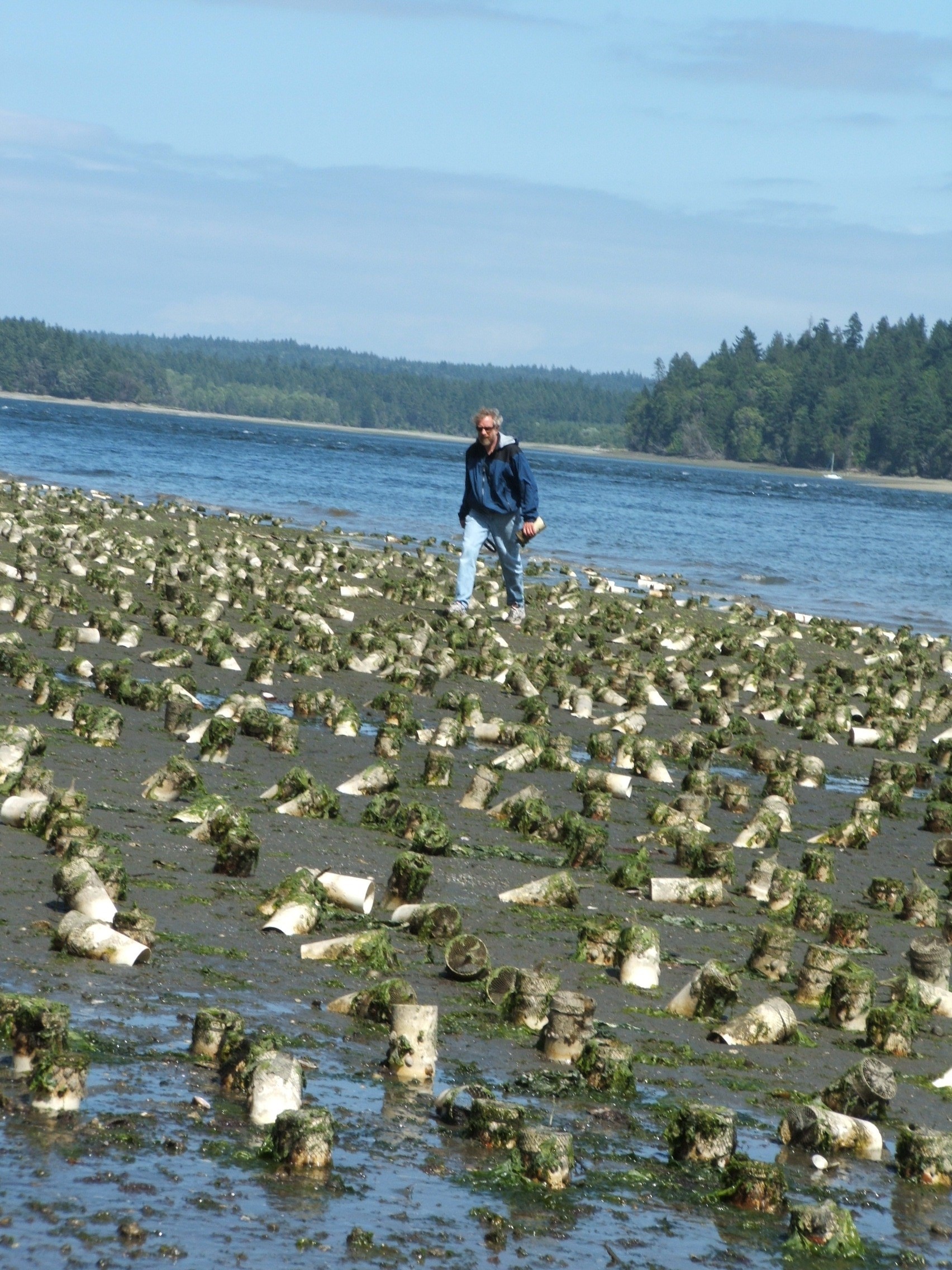Shorelines, Marine Ecosystems & Aquaculture
The Sierra Club shoreline and aquaculture policies support Puget Sound salmon recovery efforts. We support independent shellfish growers whose sustainable practices do not include industrial practices such as the use of pesticides and introducing plastic pollution in our marine waters (PVC tubes, nets, growbags). Our concerns are focused on the expansion of industrial aquaculture that eliminate our native species and interfere with citizens' rights to responsibly enjoy our shorelines.

above: PVC Pipes used in goeduck growing operation despoiling shoreline.
THIS JUST IN: Federal Greenlight of Industrial Aquaculture Deemed Unlawful by Federal Court of Appeals!
Industrial Aquaculture on YouTube:
"Is This Your Vision for Puget Sound?"
"I am the Puget Sound"
Sierra Club Documents:
Industrial Aquaculture Degrades Water Quality, 2012
Shellfish Reduce Zooplankton May, 2012
Industrial Aquaculture Marine Plastic Pollution 2012
Sierra Club Eelgrass Protection
Shellfish Industry Minimal Taxation
Sierra Club Industrial Aquaculture Impacts October, 2011
Minimal Nitrogen Reduction by Shellfish Aquaculture-2012
National Marine Fisheries-Shellfish Aquaculture-2012
Sierra Club Aquaculture Presentation July, 2010
Sierra Club Aquaculture Flyer April 2009
Shellfish Industry Places Massive Quantities of Plastic Debris and Chemical/Toxic Pollution Into Puget Sound.
See: "The Use of PVC Plastics for Aquaculture in Puget Sound"
Aquaculture Impacts:
Shellfish Industry Document "Pest Management Strategic Plan for Bivalves in Oregon and Washington"
Destructive Shellfish Industry Practices on the Beach
"A New View of the Puget Sound Economy" -- Earth Economics
Puget Sound Basin provides between $7.4 and $61.7 billion in benefits to people every year. If the “natural capital” of the Puget Sound basin were treated as an economic asset, the asset value would be at least $243 billion and $2.1 trillion.....The natural assets of the Puget Sound basin are tremendously valuable economic assets that are being lost and degraded. P.5.
Estuaries and bays, rocky islets, headlands, intertidal areas, rock reefs, sea grass, and kelp beds all buffer against wave energy. Shorelines are built and maintained naturally with interactions of the physical aspects of these structures, wave energy, tides, and sediment deposition. The biota in mudflats and nearshore soft bottom sediments also play a key role in maintaining the structure of sediments and preventing erosion (Weslawski et al.,2004). When these features are removed or significantly altered, dramatic changes and loss of shorelines can occur... Thus, retention of ecosystem features that stabilize the shoreline helps reduce the cost of engineered stabilization efforts, maintains habitat for species that use beach and nearshore ecosystems, and retains space for recreation and aesthetic enjoyment of the Sound. P.34.
The Science:
Shellfish Aquaculture Regulatory Committee SeaGrant Presentations
"The Ecological Role of Bivalve Shellfish Aquaculture in the Estuarine Environment" (Dumbauld, Ruesink, Rumrill, 2009)
Aquaculture Studies Review --Prepared by The Association for Responsible Shellfish Farming, Canada-2009
DNR May 3-7 Forum--Intertidal Geoduck Public Comments -- The public comments contained in these 159 pages document an overwhelming majority of citizens are opposed to DNR leasing public tidelands for geoduck feedlots. The environmental and social impacts are outlined in detail.
Preservation and Protection of Marine Shorelines:
The Marine Ecosystems Team works on these issues, leading the effort to protect our marine shorelines and intertidal zones from unregulated and potentially destructive aquaculture development. They are working on initiatives at the national, state and county levels in support of sustainable marine habitats. Contact our Marine Ecosystem Team at: <marine@washington.sierraclub.org> for questions.